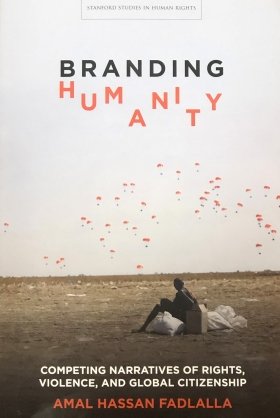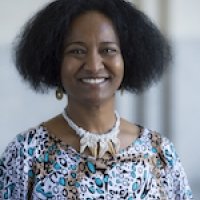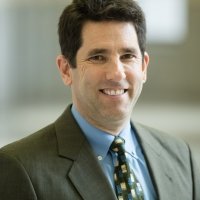Books at Wilson: "Branding Humanity: Competing Narratives of Rights, Violence, and Global Citizenship"


On January 23, Dr. Amal Hassan Fadlalla returned to the Wilson Center to launch her new book on Sudan, Branding Humanity: Competing Narratives of Rights, Violence, and Global Citizenship, which was written based on research she conducted at the Wilson Center. Dr. Marisa O. Ensor, Research Professor with the Justice and Peace Studies Program and Institute for the Study of International Migration, at the Georgetown University School of Foreign Service joined Dr. Fadlalla. Mr. Mike Morrow, Senior Diplomatic Fellow with the Wilson Center Africa Program, moderated the event.
Event Summary
Dr. Fadlalla began the discussion by noting that activists in the Sudan and in the Sudanese diaspora have inspired her book. Sudan has always been an extremely diverse country, with a multitude of ethnic groups — each with their own history, languages, and claims to land and heritage. Since independence, efforts to build an inclusive national identity have largely failed to bridge gender, race, class, and ethnic divisions. These divisions have led to conflict, the emergence of a large diaspora, and the partition of the country. In Branding Humanity, Dr. Fadlalla analyzed how different actors have mobilized identity politics in Sudan, and how Sudanese at home and overseas have contested and reshaped these dialogues. She noted that the narrative of ethnic conflict espoused by human rights and humanitarian organizations failed to capture the full diversity of the country — ultimately contributing to further divisions and conflict. In her research, Dr. Fadlalla found that many Sudanese who did not align with either Islamism or human rights-focused humanitarianism — especially those in the diaspora — instead created their own spaces. In this “diaspora public” Sudanese activists and leaders built platforms for more nuanced dialogue, debate, and protest. She closed by noting that the identity politics engaged by Islamist and human rights organizations had failed to include minority citizens both nationally and transnationally, and that identity politics should not yield to existing conditions, conservative politics, and hegemonic understandings of citizenship.
Dr. Ensor commented on the unique approach of the book, and discussed with Dr. Fadlalla about how her approach provided an insight that was different from a political science or historical approach. They discussed what some of the actionable lessons from the book might be, with Dr. Fadlalla noting that while the social divisions in Sudan had only deepened among the diaspora, she was confident they could still be overcome. As evidence of this, she cited the ongoing protests in the Sudan, where protestors are using slogans calling for national unity and an inclusive nation-state.
Drs. Fadlalla and Ensor observed that existing social divisions tend to extend to cross-border groups, often deepening; and that identities take on new meaning, and are manipulated and instrumentalized. Dr. Fadlalla noted that her experience as a woman of Sudanese origin had not prevented her from being challenged (and sometimes rejected) by other groups of Sudanese — clarifying that identity is not always as simple as an insider/outsider divide. Both speakers acknowledged the role that climate change plays in exacerbating poverty and conflict in the region. Finally, Dr. Fadlalla observed that there is an active and diverse civil society both in Sudan and in the diaspora, including many groups that have stepped in to “fill the gaps” where the state has failed to provide services.
Selected Quotes
Amal Hassan Fadlalla
“In practice, efforts at nation-building in the Sudan have consistently failed to bridge gender, race, class, and ethnic divisions. So, this debate over national belonging has resulted in violent conflicts, leading to increasing immigration of Sudanese people to different countries in the world, including to the United States, and ultimately to the division of the country into two nation states.”
“Within these diaspora publics, Sudanese community leaders, celebrities, and activists come together to create temporary platforms for negotiating pertinent issues related to gender, ethnicity, race, and diversity in the Sudan and in the diaspora. Diaspora publics have also been spaces for protesting the practices of the current regime from different global locations, as the ongoing protest in both the Sudan and in the diaspora have shown in recent days.”
“I mention what is happening in Sudan now because these are the same activists that were excluded, you know, in the different campaigns… Now what they are doing is they are claiming the street. They are claiming the streets and something beautiful is coming out of that that I have not...noticed before, where they are trying to unite, not fragment.”
“The two clashing visions of Islamism and rights-based humanitarianism failed to address the demands of ethnic diversity and inclusion... So as we fight for rights, as we fight for inclusion, and as we fight for a humanist future, we also ought to remember that identity politics should not yield to existing social divisions, conservative ideologies, and hegemonic understanding of citizenship.”
Related Publication

Branding Humanity: Competing Narratives of Rights, Violence, and Global Citizenship
Speakers

Associate Professor of Women's Studies, Anthropology, and Afroamerican and African Studies, University of Michigan, Ann Arbor
Moderator

Senior Foreign Service Officer, U.S. Department of State
Hosted By

Africa Program
The Africa Program works to address the most critical issues facing Africa and US-Africa relations, build mutually beneficial US-Africa relations, and enhance knowledge and understanding about Africa in the United States. The Program achieves its mission through in-depth research and analyses, public discussion, working groups, and briefings that bring together policymakers, practitioners, and subject matter experts to analyze and offer practical options for tackling key challenges in Africa and in US-Africa relations. Read more
